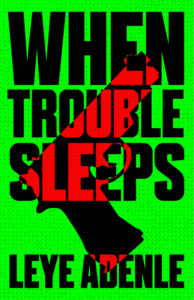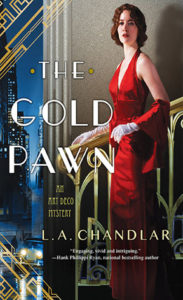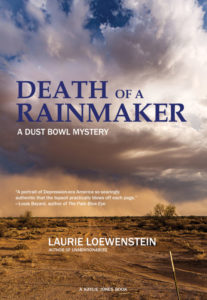Every season, the book world lines up to sing the praises of the debut, but what about the second novel? When it comes time to support writers embarking on the hard work of building a career in crime literature, the establishment, and readers, are often more muted with their applause. Part of this is our modern urge to seek the new, and another part is the worry, among many well-read genre fans, of becoming emotionally beholden to favorite series, to the exclusion of other worthwhile stories. But how about throwing caution to the wind and falling in love with an author who’s just establishing their voice? How about taking that journey with them? From now on, we’ll be rounding up the best and brightest in sophomore mysteries, crime novels, and thrillers, each season. Here’s our fall round up of seven second books, from seven authors to watch.
Leye Adenle, When Trouble Sleeps (Cassava Republic)
Leye Adenle’s debut, Easy Motion Tourist, took the international crime scene by storm, with its impeccably choreographed action sequences, clever division of Lagos into set-pieces that showcase the highs and lows of the city, and easy-to-root-for human rights worker heroine, Amaka Mbadiwe. In Adenle’s second in the series, When Trouble Sleeps, Amaka returns in her role of savior of the sex workers to combat a prominent politician with some vicious little secrets.

Iain Reid, Foe (Gallery/Scout Press)
Reid’s debut thriller, I’m Thinking About Ending Things, was a runaway hit in 2016 and a critical darling. This year Reid is back with a worthy follow-up. Foe is a fever dream of domestic suspense—a taut disorienting story full of secret motivations, obscure demands, and an unbearable, unknowable tension that permeates every scene. In an undefined near-future, a couple living on a farm receives a guest who upends their lives by informing the husband he is to be sent far away and, effectively, replaced. Reid traces a vein of dread through the strange interactions, and in the process proves himself one of the most promising voices in thrillers today.
Joanna Cannon, Three Things About Elsie (Scribner)
Cannon’s debut, The Trouble With Goats and Sheep, established her as a new voice of small-town secrets, and a master at representing the complex world of adults through the eyes of a child. Her second mystery, Three Things About Elsie, begins with an elderly woman injured in a fall. What happened sixty years before, and what does the woman’s new tenant have to do with it? Joanna Cannon, with her kind-hearted yet clear-eyed understanding of human foibles, is perhaps the Frederic Bachman of crime fiction, which is to say, she is very good at what she does.
L.A. Chandlar, The Gold Pawn (Kensington)
L. A. Chandlar’s 1930s-set Art Deco mysteries, featuring Fiorello LaGuardia and a host of other historical figures, are an attempt to flesh out our grey-scale visions of the Great Depression with the huge output of artists and political figures during the time period. Chandlar’s message is one we can all get behind: sometimes, historical suffering can result in both great art and a perfect setting for mysteries.
Emma Viskic, And Fire Came Down (Pushkin Vertigo)
In Emma Viskic’s second book to feature her deaf protagonist, Caleb Zelic, small town secrets lead to big confrontations. Viskic won the Ned Kelly Award last year for Resurrection Bay, her debut, and her second in the series promises to be just as devastating—and ever so Australian, with a bushfire alert and particularly Australian conflicts ratcheting up the tension throughout.
Laurie Loewenstein, Death of a Rainmaker (Akashic)
Loewenstein’s debut effort was the engaging and illuminating historical epic, Unmentionables, set against a feminist awakening in 1917 small-town America. With her latest, a murder mystery unfolding in the 1930’s Dust Bowl region, Loewenstein is establishing herself as a master of nuanced historical fiction, especially when it comes to the political infighting and swirl of intrigue around small communities in the early half of the 20th century. Loewenstein is a talented researcher with an eye for the historical detail, but also a gifted storyteller capable of breathing life into a wide cast of characters. For historical fiction readers, this is an author to watch.
Leo Benedictus, Read Me (Twelve Books)
Benedictus’s debut novel, a demimonde satire called The Afterparty, was clever and engaging but gave only a hint of how creepy and tense a story he was capable of constructing. With Read Me, Benedictus has an assured, accomplished, thoroughly spine-chilling new novel. Read Me is consciously under the influence of Hitchcock and takes its pacing seriously, with a narrative structure (following a serial stalker around London as he chooses prey and slowly worms into their lives) that keeps the pages turning and implicates narrator and reader alike in a disturbing tale, one you won’t soon forget and which will keep you eagerly awaiting the next step in the author’s career.























